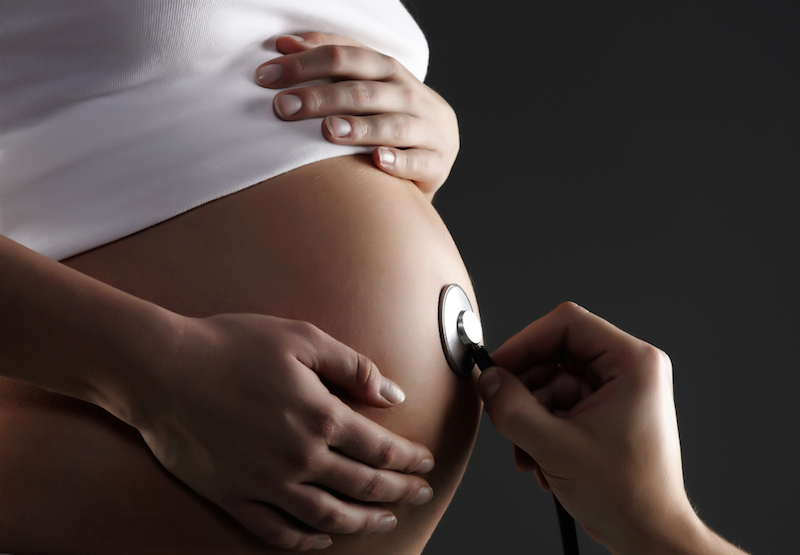Most Americans Believe Miscarriage Myths

Miscarriages are common, but the majority of Americans still think they occur rarely, a new survey finds.
The nationwide online survey found that 55 percent of people in the United States believe that miscarriage happens in 5 percent or less of all pregnancies. But in reality, miscarriages end 15 to 20 percent of reported pregnancies, according to the researchers.
Miscarriage myths affect more than just people in the United States; they are a universal problem, said the study's senior author, Dr. Zev Williams, the director of the Program for Early and Recurrent Pregnancy Loss at the Albert Einstein College of Medicine and Montefiore Health System in New York City. [Blossoming Body: 8 Odd Changes That Happen During Pregnancy]
People tend to treat miscarriage as a taboo subject, and many women blame themselves for losing a pregnancy, Williams said.
"I've taken care of sisters who didn't know that each of them were having recurrent miscarriages," because they didn't tell each other, Williams told Live Science. "But you don't see that with anything else. I ask for family histories, so everyone knows when their family has heart disease, diabetes and Alzheimer's. But miscarriages, people don't talk about them."
Here's a look at five lessons about miscarriages doctors and the public could learn, based on what the researchers found to be common misconceptions about miscarriages in their survey, set to be published on Monday (May 11) in the journal Obstetrics & Gynecology.
1. Miscarriages are common
Get the world’s most fascinating discoveries delivered straight to your inbox.
In reality, about 1 out of 5 pregnancies, or between 750,000 and 1 million pregnancies yearly in the United States, end in miscarriage.
—Abortion laws by state: https://reproductiverights.org/maps/abortion-laws-by-state/
—For questions about legal rights and self-managed abortion: www.reprolegalhelpline.org
—To find an abortion clinic in the US: www.ineedanA.com
—Miscarriage & Abortion Hotline operated by doctors who can offer expert medical advice: Available online or at 833-246-2632
—To find practical support accessing abortion: www.apiarycollective.org
But according to the survey, 10 percent of participants said they thought that fewer than 2 percent of all pregnancies ended in miscarriage.
This misconception was 2.5 times more common among men than women, the researchers found.
One possible reason many people hold such mistaken beliefs is that few people talk about miscarriages, Williams said.
2. People don't understand its causes
The majority of miscarriages happen for medical or genetic reasons. For instance, about 60 percent of miscarriages occur because of aneuploidy, which is the presence of an incorrect number of chromosomes. Other causes can be related to the mother's health conditions, such as whether there are structural abnormalities in the uterus, or if she has an endocrine disorder or an autoimmune disorder.
But 22 percent of the survey participants incorrectly said that lifestyle choices, including drug, alcohol or tobacco use during pregnancy, were the single most common causes of miscarriage, the researchers found. Men were 2.6 times more likely to think this than women, the study found.
People also falsely attributed miscarriages to other factors. For instance, the majority of participants said that a stressful event (76 percent) or longstanding stress (74 percent) could cause a miscarriage.
A large number of participants said that a miscarriage could be caused by lifting a heavy object (64 percent of respondents), having a sexually transmitted disease in the past (41 percent), using an intrauterine device in the past (28 percent), using oral contraception in the past (22 percent) or getting into an argument (21 percent), the researchers found.
None of these factors cause miscarriages, the researchers said. [5 Myths About Fertility Treatments]
Williams said he treated one patient who said that, while pregnant, she had doubts about whether she'd be a good mother. "She miscarried a couple of days later" and was tormented by the thought that she miscarried because she "didn't want it enough," he said. In reality, there is no way that such thoughts could bring on a miscarriage.
3. Miscarriages make people feel guilt and shame
About 15 percent of the survey participants said they had been personally affected by miscarriage, and these participants answered additional questions about their experience, the researchers said.
Among those affected by a miscarriage, 47 percent said they felt guilty, 41 percent said they felt like they did something wrong, 28 percent reported feeling ashamed, and 38 percent said they felt like they could have prevented it somehow, the researchers found.
Most of them (57 percent) were not told what might have caused the miscarriage. Some were told, "It just happens," or "We don't know."
But knowing the possible cause can be helpful, the researchers wrote. A majority of respondents, 88 percent, said they would want to know the cause, even if it wasn't something they could have prevented, the researchers found.
Among the people who were given a reason for the miscarriage, 19 percent fewer felt as if they were to blame, compared to those who were not given a reason, the researchers found.
4. People who miscarry need support
Even among people who haven't miscarried, more than one-third said that a pregnancy loss would be "extremely upsetting, equivalent to the loss of a child," the researchers found.
Of the people who miscarried, 74 percent said they received emotional support from the people they told, but only 45 percent said the medical community had provided adequate emotional support.
Celebrities can also help. Of survey participants who miscarried, 28 percent said that public figures who shared their miscarriage stories, including Ann Romney, the wife of former presidential candidate Mitt Romney, and actress Gwyneth Paltrow, helped ease their feelings of isolation, the study found.
However, friends helped even more. When a friend revealed a miscarriage, 46 percent of study participants said they felt less isolation after their own miscarriages.
"When people start talking about it, it has a very positive effect," Williams said.
5. More awareness is needed
Few people advocate for greater public awareness of miscarriage because the topic can be emotionally difficult to discuss, Williams said.
"Because it's such a taboo subject, you don't see advocacy for it, you don't see these support groups, you don't see people lobbying Congress to get more funding," he said. "And so research in miscarriage is dwarfed by all of these other conditions, even in women's health."
Even doctors may unknowingly discourage open discussion.
"When a woman does become pregnant, we tell them keep it quiet," he said. "The subtext to that is you might miscarry, and you don't want people to find out about it."
Follow Laura Geggel on Twitter @LauraGeggel. Follow Live Science @livescience, Facebook & Google+. Original article on Live Science.
Editor's note: This article was updated on August 4, 2022 by Live Science contributor Alice Ball following the Supreme Court's decision to overturn Roe v. Wade on June 24, 2022. This decision eliminated the constitutional right to abortion that was established by the 1973 court case and later affirmed by a 1992 case called Planned Parenthood of Southeastern Pennsylvania v. Casey.

Laura is the managing editor at Live Science. She also runs the archaeology section and the Life's Little Mysteries series. Her work has appeared in The New York Times, Scholastic, Popular Science and Spectrum, a site on autism research. She has won multiple awards from the Society of Professional Journalists and the Washington Newspaper Publishers Association for her reporting at a weekly newspaper near Seattle. Laura holds a bachelor's degree in English literature and psychology from Washington University in St. Louis and a master's degree in science writing from NYU.


